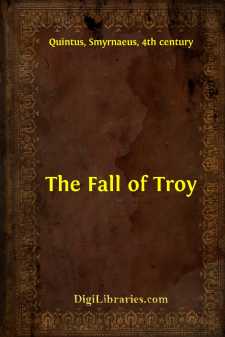Categories
- Antiques & Collectibles 13
- Architecture 36
- Art 48
- Bibles 22
- Biography & Autobiography 813
- Body, Mind & Spirit 142
- Business & Economics 28
- Children's Books 15
- Children's Fiction 12
- Computers 4
- Cooking 94
- Crafts & Hobbies 4
- Drama 346
- Education 46
- Family & Relationships 57
- Fiction 11828
- Games 19
- Gardening 17
- Health & Fitness 34
- History 1377
- House & Home 1
- Humor 147
- Juvenile Fiction 1873
- Juvenile Nonfiction 202
- Language Arts & Disciplines 88
- Law 16
- Literary Collections 686
- Literary Criticism 179
- Mathematics 13
- Medical 41
- Music 40
- Nature 179
- Non-Classifiable 1768
- Performing Arts 7
- Periodicals 1453
- Philosophy 64
- Photography 2
- Poetry 896
- Political Science 203
- Psychology 42
- Reference 154
- Religion 513
- Science 126
- Self-Help 84
- Social Science 81
- Sports & Recreation 34
- Study Aids 3
- Technology & Engineering 59
- Transportation 23
- Travel 463
- True Crime 29
The Fall of Troy
Categories:
Description:
Excerpt
Homer's "Iliad" begins towards the close of the last of the ten years of the Trojan War: its incidents extend over some fifty days only, and it ends with the burial of Hector. The things which came before and after were told by other bards, who between them narrated the whole "cycle" of the events of the war, and so were called the Cyclic Poets. Of their works none have survived; but the story of what befell between Hector's funeral and the taking of Troy is told in detail, and well told, in a poem about half as long as the "Iliad". Some four hundred years after Christ there lived at Smyrna a poet of whom we know scarce anything, save that his first name was Quintus. He had saturated himself with the spirit of Homer, he had caught the ring of his music, and he perhaps had before him the works of those Cyclic Poets whose stars had paled before the sun.
We have practically no external evidence as to the date or place of birth of Quintus of Smyrna, or for the sources whence he drew his materials. His date is approximately settled by two passages in the poem, viz. vi. 531 sqq., in which occurs an illustration drawn from the man-and-beast fights of the amphitheatre, which were suppressed by Theodosius I. (379-395 A.D.); and xiii. 335 sqq., which contains a prophecy, the special particularity of which, it is maintained by Koechly, limits its applicability to the middle of the fourth century A.D.
His place of birth, and the precise locality, is given by himself in xii. 308-313, and confirmatory evidence is afforded by his familiarity, of which he gives numerous instances, with many natural features of the western part of Asia Minor.
With respect to his authorities, and the use he made of their writings, there has been more difference of opinion. Since his narrative covers the same ground as the "Aethiopis" ("Coming of Memnon") and the "Iliupersis" ("Destruction of Troy") of Arctinus (circ. 776 B.C.), and the "Little Iliad" of Lesches (circ. 700 B.C.), it has been assumed that the work of Quintus "is little more than an amplification or remodelling of the works of these two Cyclic Poets." This, however, must needs be pure conjecture, as the only remains of these poets consist of fragments amounting to no more than a very few lines from each, and of the "summaries of contents" made by the grammarian Proclus (circ. 140 A.D.), which, again, we but get at second-hand through the "Bibliotheca" of Photius (ninth century). Now, not merely do the only descriptions of incident that are found in the fragments differ essentially from the corresponding incidents as described by Quintus, but even in the summaries, meagre as they are, we find, as German critics have shown by exhaustive investigation, serious discrepancies enough to justify us in the conclusion that, even if Quintus had the works of the Cyclic poets before him, which is far from certain, his poem was no mere remodelling of theirs, but an independent and practically original work. Not that this conclusion disposes by any means of all difficulties. If Quintus did not follow the Cyclic poets, from what source did he draw his materials? The German critic unhesitatingly answers, "from Homer." As regards language, versification, and general spirit, the matter is beyond controversy; but when we come to consider the incidents of the story, we find deviations from Homer even more serious than any of those from the Cyclic poets. And the strange thing is, that each of these deviations is a manifest detriment to the perfection of his poem; in each of them the writer has missed, or has rejected, a magnificent opportunity. With regard to the slaying of Achilles by the hand of Apollo only, and not by those of Apollo and Paris, he might have pleaded that Homer himself here speaks with an uncertain voice (cf. "Iliad" xv. 416-17, xxii. 355-60, and xxi. 277-78). But, in describing the fight for the body of Achilles ("Odyssey" xxiv....


